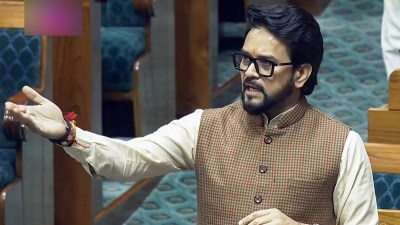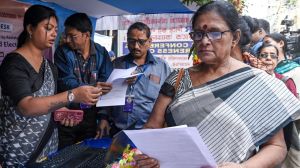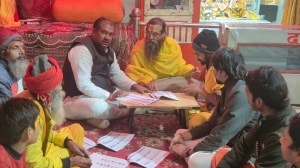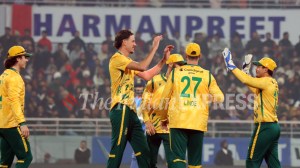Thuramukham is (un)arguably one of the most awaited Malayalam films of recent times. Well, probably second only to the four-hour director’s cut of Kammatipaadam (2016). Ever since actor Nivin Pauly shared the first-look poster of the film via his Instagram account on January 5, 2020, Malayalam film audiences have eagerly been waiting for its release.

But the wait is finally over. Thuramukham hit the screens on March 10 and it is unlike anything we have seen up to this point, despite the fact that it is fundamentally a historical drama and a political film to its core. In an exclusive interview with indianexpress.com, cinematographer-turned-director Rajeev Ravi discusses the politics of the film, what he unearthed while researching the Mattanchery firing of 1953, how to interpret the incident in the current sociopolitical climate and more.
Edited excerpts:
Thuramukham has finally made it to the big screen after many attempts and deliberations. Do you feel relieved? Or are you anxiously anticipating the viewers’ responses?
I must admit that I am relieved. Even while I am anticipating the audience’s reactions, I am more than a little relieved that the movie has finally been released.
Only significant historical movements or events inspire filmmakers to make historical movies. The majority of these movies are either biopics of famous people, visual depictions of well-documented events, or wholly historical fiction. Underdocumented incidents such as the Mattancherry firing of 1953 (on which Thuramukham is based) rarely find any takers. Why?
Wherever in the world, all of the historical records and writings that we have today were produced at the behest of the wealthy, including the kings, moguls, lords, and feudal lords. They were commissioned; someone paid for it all and had it written for them. They’re not about the common man. The proletarian struggles never got a space in these historical texts. They left no paper trail. Take for instance the Mattanchery riot that happened in 1953, which was after India gained its independence. That was not properly documented. Even the government documents don’t mention it. There are no police documents either since there was no Kerala police at that time. Despite the fact that collectors used to report on such events while Britain was in power, the Mattanchery riot is not mentioned anywhere. No data was kept on the number of fatalities or injuries. Nothing! What transpired is unknown. Either someone disposed of all the reports or no one bothered to keep track of the incident.
Story continues below this ad
The Mattancherry firing took place during protests by labourers seeking eight-hour work days and an end to the chappa system. It took place in India after Independence, though before the formation of the state of Kerala. Records show that at least three workers were shot and killed. Pattom A Thanu Pillai, the then Chief Minister of the Thiru-Kochi government, apparently justified the firing by saying that it was prompted by the port workers’ “use of criminal force”. Even then, there was little documentation of the incident and the employees’ protests. During the creation of Thuramukham, what discoveries did you make?
In Kochi and Mattanchery, there are numerous stories floating around concerning the occurrence. Despite the fact that I was born and raised in Ernakulam, all I had heard was about the riot. In my earlier years, I was unaware of the cause of this riot. Keralites, or probably the entire nation, see Mattanchery in a bad light. It is considered a ghetto where Muslims stay together. Some even refer to it as Pakistan. It’s challenging for young men in the neighbourhood to obtain passports. I discovered as I began my research into the tragedy that there are numerous accounts of it, and from these accounts, we get the impression that the riot claimed a greater number of lives and injured many more. Unfortunately, there is no way for us to know for sure. Such incidents continue to occur in other locations too, but yet only one of them may get documented. I learned a lot of fascinating details about it, that were not documented (by the authorities), from a play written by the father of one of my friends. The play is set in a home with a mother and her two sons as the main characters. The Mattanchery riot is also depicted in this drama as occurring in the background, outside the home. We do get to hear both its sounds and the outside activity. By combining this drama with the stories I heard from the people, I was able to conjure up my own Mattanchery. So the story of the movie is not just what I discovered in records. It needs to be mentioned that the late Malayalam film director P A Backer also made a film about the Chappa system in the past (Chappa, 1982).
There are claims that the government is still actively suppressing opposition voices, even in the era of supposed “Amrit Kaal”, using state apparatus, forces, and central agencies. You stated recently in an interview with The Cue that the only way to develop a sound political ideology is by thoroughly researching the past. How should the Mattancherry shooting be interpreted in the current sociopolitical climate?
These things continue to occur worldwide! Whenever people get pushed to the corner and then when they react spontaneously, the state machinery cracks down on them. The British, who were a bunch of drug traffickers, developed the system we have now which includes the Army, the police, and other agencies. So, we cannot anticipate more from the current system than this. It is not for the average person; it is for the wealthy. Thus, the forces will undoubtedly retaliate when the general populace responds. The forces work for the benefit of businessmen—for those who earn more money—rather than the welfare of the general public. Everything that is happening right now happened in the 1950s and even before. Even now, the state would undoubtedly attempt to thwart the workers’ decision to strike. There has been no change in the situation. The chappa system still prevails, albeit in a more “refined”, “polished”, and “civilised” manner; we have not liberated ourselves from it. It serves as a reminder that, similar to the former slave system, it is still in existence but in a different form. The only difference is that in the 1990s, our market expanded and a lot of new products began to arrive. An explosion occurred in the last 20 to 30 years, and people who previously owned bikes began to purchase cars. People began following that boom as a result. The sociopolitical climate, however, has not changed. The working class still needs to toil and agitate for their rights even in the current environment.
Story continues below this ad
Over the years, you have gained a reputation, particularly with the audience, for your unique approach to filming, which includes using the screenplay just as a tool to probably recall the order of the scenes or establish a basic structure. As an adaptation of a play by KM Chidambaran, Thuramukham, however, must have had a full, proper script. So, it is safe to say that this film was completely outside of your “comfort zone”. How did you find the experience?
My comfort zone has always been the process of making films. While making a movie, I like to experiment. When I said in one of my earlier interviews that “we should burn our scripts”, there was a lot of uproar. I said that from an aesthetic point of view. Nonetheless, it was misinterpreted. We unquestionably require a script or text. Yet it’s not necessary for this to be the last word. The script is only the start. In the past, there was a propensity in our field to regard scripts as the last word. You are constrained by that baggage because you are forced to operate inside its confines. There is no place for a filmmaker there. A director should advance with a text and take it to a new level after receiving it or after getting inspired by it. That’s what filmmaking is all about. I meant to say that. We must abandon the idea of using only one tough format.
Most of our industries have a history of playwrights coming into the field and writing scripts for films. These scripts focused heavily on dialogues. Cinema is not just about dialogues, right? It is also about the images. I have the utmost respect for scripts, scriptwriters, and the scripting process. But I don’t think it’s best to adhere strictly to the script. I prefer the filmmaking process where spontaneity and my instincts also come into play. What makes me the most excited is the entire filmmaking process. I try to enjoy taking each and every shot. Thuramukham did have a solid script, especially considering that it was an adaptation of a play and we had to work around it. Yet I did tangentially go beyond that at places. That’s just the way I make movies. Sometimes it works, sometimes it doesn’t… We are not master filmmakers, right? Moreover, we are learning… I see the process of making movies as one in which I also get to learn stuff through trial and error. Only through practice can you learn. There are instances when your intuition directs you to act in a certain manner, and you do so. Then you realise if it is correct or incorrect, and that is how you learn. I relish that procedure. For me, the box office has never been a major concern.
 Rajeev Ravi’s Thuramukham has opened to positive reviews. (Photo: Facebook/Geetu Mohandas)
Rajeev Ravi’s Thuramukham has opened to positive reviews. (Photo: Facebook/Geetu Mohandas)
Thuramukham will be screened in front of a large group of people who fought a pandemic and whose film-watching habits have changed, especially with the popularity of OTT platforms. Do you worry that because the movie was made prior to the pandemic, the new sensibilities may have some impact on it?
Story continues below this ad
Indeed, people’s sensibilities have changed, but I don’t believe their sufferings have… The working class’ woes have gotten progressively worse. Many people were struggling during Covid without jobs, as we witnessed. Though I can’t guarantee that my movie will succeed, I think that some of the themes it explores—particularly those that deal with struggles—might resonate with viewers. To determine whether it occurred, I believe we must wait until the responses start to flood in.
Even while big stars and even bigger production companies went ahead with direct OTT releases for a couple of their movies, Team Thuramukham refrained from taking such a step. Any particular reasons?
I made Thuramukham for the big screen. The OTT boom happened just recently, right… Compared to the large screen, their sensibilities are very different. There’s no denying that OTT is a stunning instrument. In addition, I’d like to try it out and perhaps create a series one day. But, watching movies on large screens is a very different experience. I’m not sure if I’ll be able to make any more films for theatres in the future. So I basically went all out and set it up for an absolute theatre watch. Also, a filmmaker will eventually become someone who produces commodities if they begin thinking about how people’s sensitivities have evolved. You then start making calculations to market a commodity. Thus, all of your calculations are financial in nature and you are attempting to sell a good. I do that as a cinematographer, but not as a filmmaker. I don’t try to make a movie taking into account how people’s sensibilities have changed. That’s not how I can work… I am unable to think in that pattern or view movies as a product. Frankly, it’s really simple to start going the former way. Everyone, not only those in the industry but also the general public, will have a theory on what will work or not. Then, making movies becomes a means of making money. I, therefore, make a conscious effort to avoid it.
In contrast to your earlier works, Thuramukham’s cast list has a lot of big names. How was it to work with so many extremely talented actors?
Story continues below this ad
They are all friends whom I have known for a long time. As a result, working with them was quite comfortable for me. It was somewhat like being with family. Also, I have known all of these artistes since their initial days because I have been working in this sector for close to 25 years. And it was also a blessing that all of our artistes are so skilled.
The recently-released Selfiee, in which you worked as a cinematographer, became a huge box office failure. Though it was a remake of the Malayalam film Driving Licence, which did extremely well, the audience completely forsook the Bollywood counterpart. What, in your opinion, went wrong?
I’ll be honest; I have no idea. I never analyse box office trends. I don’t see the benefit in doing that. It’s similar to how the price of Adani Group shares varies day to day, rising and falling… The same holds true for movie performances as well. Everything will continue to change. I associate with these movies (as a cinematographer) because I have to work to survive… I have to strike a balance. I’ve been questioned about this by some people. But I need to keep working as a technician on big movies if I want to make the movies I desire. Nevertheless, I can’t say “No, these are not the kinds of movies we should create” in response to someone else’s decision to make a specific movie. That’s someone else’s work and they believe in that material and I, as a cinematographer, am helping them with that and I get paid for my labour. I use that money to create the kinds of movies I want. I have been balanced for a long time in that manner. Many have questioned my political stances and asked how I could work with Akshay Kumar, but I don’t think there’s anything wrong with that because it benefits me in other ways. One thing is certain: even while making these movies, I haven’t sold my soul. It’s similar to how some people spend a few years earning money working for multinational companies before returning home and taking up farming. I am not saying what is right and what is wrong here… I might come to regret making this choice. Yet, things are currently moving in a great, balanced direction. Relating to the box office results, I truly don’t think about what is occurring. I’ve witnessed many people’s ascent and descent; some returned after failing, while others vanished. These occurrences continue. As a filmmaker what I try to do among all these is to squeeze in what I want.
During the recent events at K R Narayanan National Institute of Visual Science and Arts (KRNNIVSA), the institute’s former chairman and filmmaker Adoor Gopalakrishnan alleged that you and Aashiq Abu took stances supporting the students “for getting publicity”. Any comments?
Story continues below this ad
Absolutely no comments (laughs). See, Adoor sir is a person we respect. Yet, we acted when we realised that something was amiss (at the institute). Even if everyone can make mistakes, they didn’t set a positive example for the students. Why would we want to disparage Adoor sir in an effort to garner publicity? Since getting publicity is a simple process nowadays, why would anyone do this (extend solidarity) for publicity?
In a society where casteism is pervasive, can a savarna person discarding their caste surname (in reference to one of Adoor Gopalakrishnan’s claims that he did so in his early 20s) make a difference?
Nothing! All it might do is help them sleep better at night! My father too did not include our caste when he named me. Did the caste system stop then? If anything, it (casteism) is going up like crazy now. Adoor sir is definitely a person who has made some very interesting films, but I don’t agree with his certain viewpoints. In 1996, during Adoor sir’s tenure as institute chairman, there was a huge strike at the Film and Television Institute of India (FTII). He was attempting to make the same decisions in KRNNIVSA as he had done back then. He made an effort to alter the course’s structure. You must keep in mind that post-Independence India had excellent art schools, like the National School of Drama (NSD) and the FTII, as well as the fine arts colleges in Baroda and Trivandrum. These were excellent institutions up until the 1990s. The costs were quite minimal. These institutions gave away education for almost free. But, what’s going on right now? Today, a course at FTII costs lakhs. A deadly trap that is. Now, in order to attend these institutions, people must obtain bank loans. Children from rural areas therefore cannot afford to attend these schools. Since the late 1990s, this has been taking place in our educational system. The same thing happened in FTII. They made an effort to restructure it for more revenue. Adoor said at that time, “They are just wasting time sitting beneath trees,” in reference to the protesting students. Their approach towards education was predominantly what we were against back then and even now. We have brilliant kids… Kerala too… We saw that during the Kerala floods… We saw that during the protests against the Citizenship Amendment Act (CAA) and the National Register of Citizens (NRC). Instead of trying to curb them, we should provide them with greater opportunities, exposure and knowledge. They deserve a quality education. Both protests were predominantly against their attitude.
Recently a lot of filmmakers made scathing remarks against reviewers and kind of questioned their qualifications to criticise a film. Some even went to the extent of saying that those without knowledge of technical aspects of filmmaking, such as editing, are ineligible to write reviews or critique movies. As a technician yourself, do you concur with this statement?
Story continues below this ad
Anybody who pays for a movie ticket and takes time out of their life to watch a film has the right to voice their opinion. Nonetheless, I believe that they were trying to convey that since making a movie entails a lot of agonies, deliberate attacks against films should be avoided. I believe they were making reference to that. We definitely want viewers to respond to and share their thoughts on our films. Inform us if our movies worked or not… I don’t believe technical expertise is required to do it. Even without discussing any of these technical details, it still counts if you just say if you liked it or not.


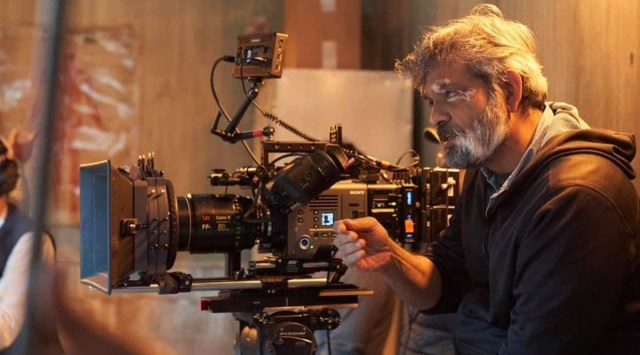

 Rajeev Ravi’s Thuramukham has opened to positive reviews. (Photo: Facebook/Geetu Mohandas)
Rajeev Ravi’s Thuramukham has opened to positive reviews. (Photo: Facebook/Geetu Mohandas)
